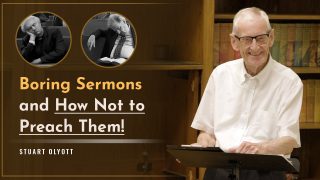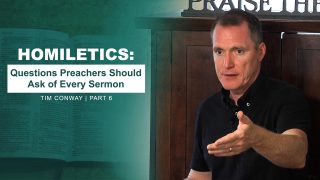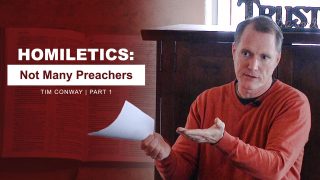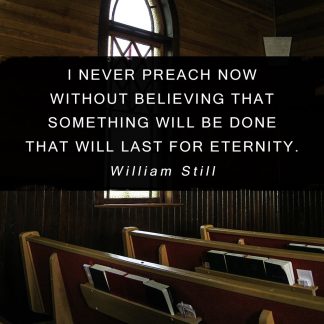Preaching is a weighty calling, James 3:1 says, “Not many of you should become teachers, my brothers, for you know that we who teach will be judged with greater strictness.” The following resources not only explore the mechanics of preaching, but explore how one knows if they are called to preach.
Other helpful resources on preaching:
- Expositor Podcast by Steve Lawson
- On the Preparation and Delivery of Sermons by John A. Broadus
- On Sermon Introductions by H.B. Charles Jr.
Application questions to ask of the text (from Steve Lawson):
- Are there examples to follow?
- What commandments to obey?
- Are there errors to avoid?
- Are there sins to forsake?
- Are there sins to confess?
- Are there promises to claim?
- Are there principles to implement?
- Are there temptations to resist?
- Are there praises to render?
- Are there attitudes to adjust?
How does the text fit? (pg. 131 – Encountering God through Expository Preaching)
- How does this text fit into the overall context of the entire Bible?
- What does this text say that furthers our understanding of the message of the entire Bible?
- How is this text built?
- Why does the truth of this text stay relevant through the centuries?
In “Encountering God through Expository Preaching“ Jim Orrick points out the importance of having good transitions so as to help people follow your message. The example given is to put, “The first point is… and you can see the basis for this point if you look at verse __.” Then when moving on to point two to say, “so we have seen the first… now let us go on to the second.”
In The Sacred Anointing, pg. 170, Tony Sargent says of Martyn Lloyd-Jones’ preaching, “Encouraging the congregation to reason matters out with him is a common denominator in his sermons irrespective of when they were preached. They revealed, furthermore, that from the beginning, his goal was to induce his largely working-class congregations to think through his arguments…”
Boring Sermons – and How Not to Preach Them!
Boring Sermons – and How Not to Preach Them!
In this message on homiletics, Stuart Olyott speaks on, "Boring Sermons – and How Not to Preach Them!" and shares helpful preaching tips.
Speculative Preaching
Speculative Preaching
Speculative preaching is preaching and majoring on what might be or what could be, instead of what is. It hopes to invoke a response or decision...
Questions Preachers Should Ask of Every Sermon (Part 6)
Questions Preachers Should Ask of Every Sermon (Part 6)
When it comes to preparing and delivering a sermon, there are countless questions that must be asked: Am I preaching my own opinion or what the text is saying?
Homiletics: Eisegesis Is Not a Light Matter (Part 5)
Homiletics: Eisegesis Is Not a Light Matter (Part 5)
When the preacher's sermon preparation leads him to commit eisegesis and he reads his own idea and meaning into the text, it is not a light matter.
Homiletics: The Preacher’s Holiness (Part 3a)
Homiletics: The Preacher’s Holiness (Part 3a)
When it comes to a study on sermon preparation we must not neglect the topic of the preacher's holiness. If there is unholiness in the preacher's life...
Tim Conway Shares About His First Time Preaching
Tim Conway Shares About His First Time Preaching
One of the things that happened when I stood in that pulpit, that first time, is my legs barely carried me into the pulpit. When I got there...
Homiletics: Called to Preach (Part 2)
Homiletics: Called to Preach (Part 2)
The Lord designs some to specifically have a special calling to preach that is above and beyond the norm. It is God alone who knows how to create a preacher.
Homiletics: Not Many Preachers (Part 1)
Homiletics: Not Many Preachers (Part 1)
When studying homiletics, the art of sermon preparation and delivery, we must start with James 3:1 and consider how the Bible says...
I Charge You to Preach the Word!
I Charge You to Preach the Word!
I charge you in the presence of God and of Christ Jesus, who is to judge the living and the dead, and by his appearing and his kingdom: preach the word;...
Men, Be a Gentle Leader
Men, Be a Gentle Leader
Silence, anger, and harshness are among three things that men can be prone to fail in when leading in the family and in the church.
We Preach Christ!
We Preach Christ!
Paul describes his ministry with such exalted terminology -- "to preach the unsearchable riches of Christ" (Ephesians 3:8).
There are two lighthouses on the southernmost tip, Cape Point—the first was built too high so that its light shone above the ships and failed to guide; the second was built much lower and has proved a safer guide. The point should be lost on preachers. It is never helpful to preach over people’s heads.
The minister who does not earnestly pray over his work must surely be a vain and conceited man. He acts as if he thought himself sufficient of himself, and therefore needed not appeal to God. Yet what baseless pride to conceive that our preaching can ever be in itself so powerful that it can turn men from their sins, and bring them to God without the working of the Holy Ghost. If we are truly humble-minded we shall not venture down to the fight until the Lord of hosts has clothed us with all power, and said to us, ‘God in this thy might.’
One of the things that I find so hard about the ministry is that you have to fill so many different roles and adapt to so many different situations. One minute you are at a funeral with the loved ones of the deceased, then you are in an elders’ meeting debating a vision for the future, then you are at a prayer meeting, then a pre-engagement session, then a new member’s interview where the person thinks the church is awesome, then a meeting with a member who is thinking about leaving, then sharing the gospel with a homeless man, then heading off to meet an atheist for lunch; and in all of those situations you need appropriate words. You need to know if you ought to share a word of encouragement, an intellectual worldview challenge, simple kindness and courtesy, laughter, tears, or all of the foregoing! In all of ministry you are looking for words.
It is a sad commentary on theological education that most seminaries and Bible colleges virtually neglect the Holy Spirit’s role in preaching specifically and in the Christian ministry in general. Most homiletic courses on preaching only pay lip service to this vital area of truth.













